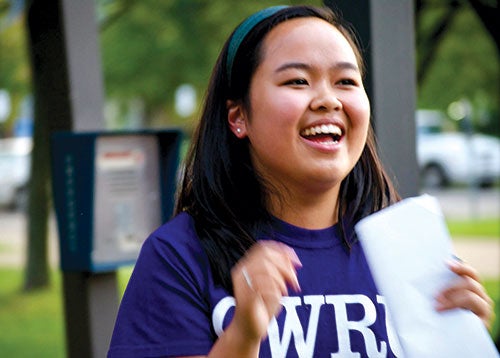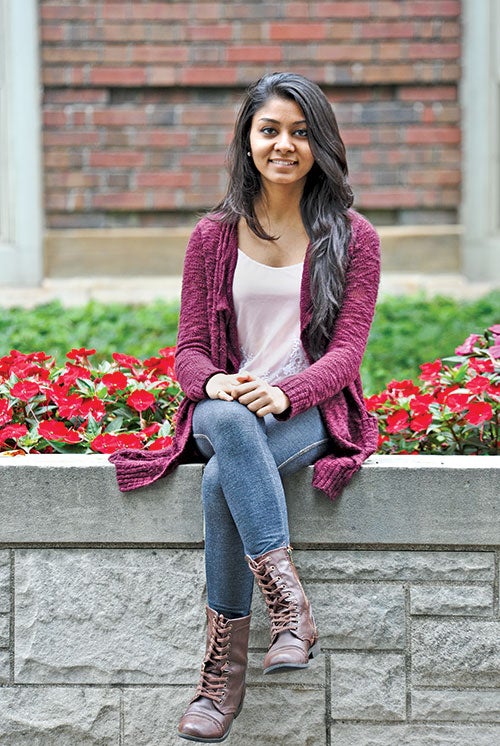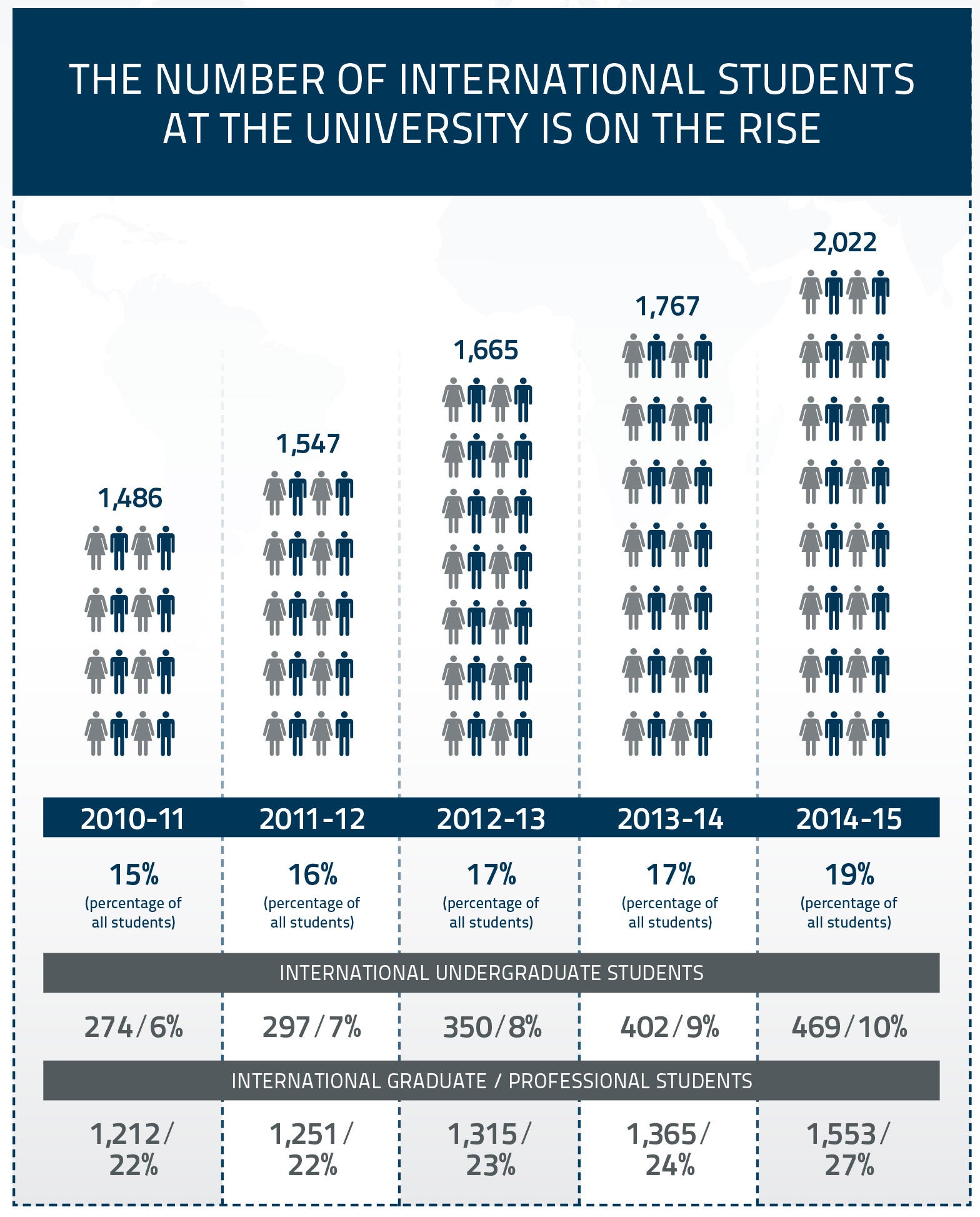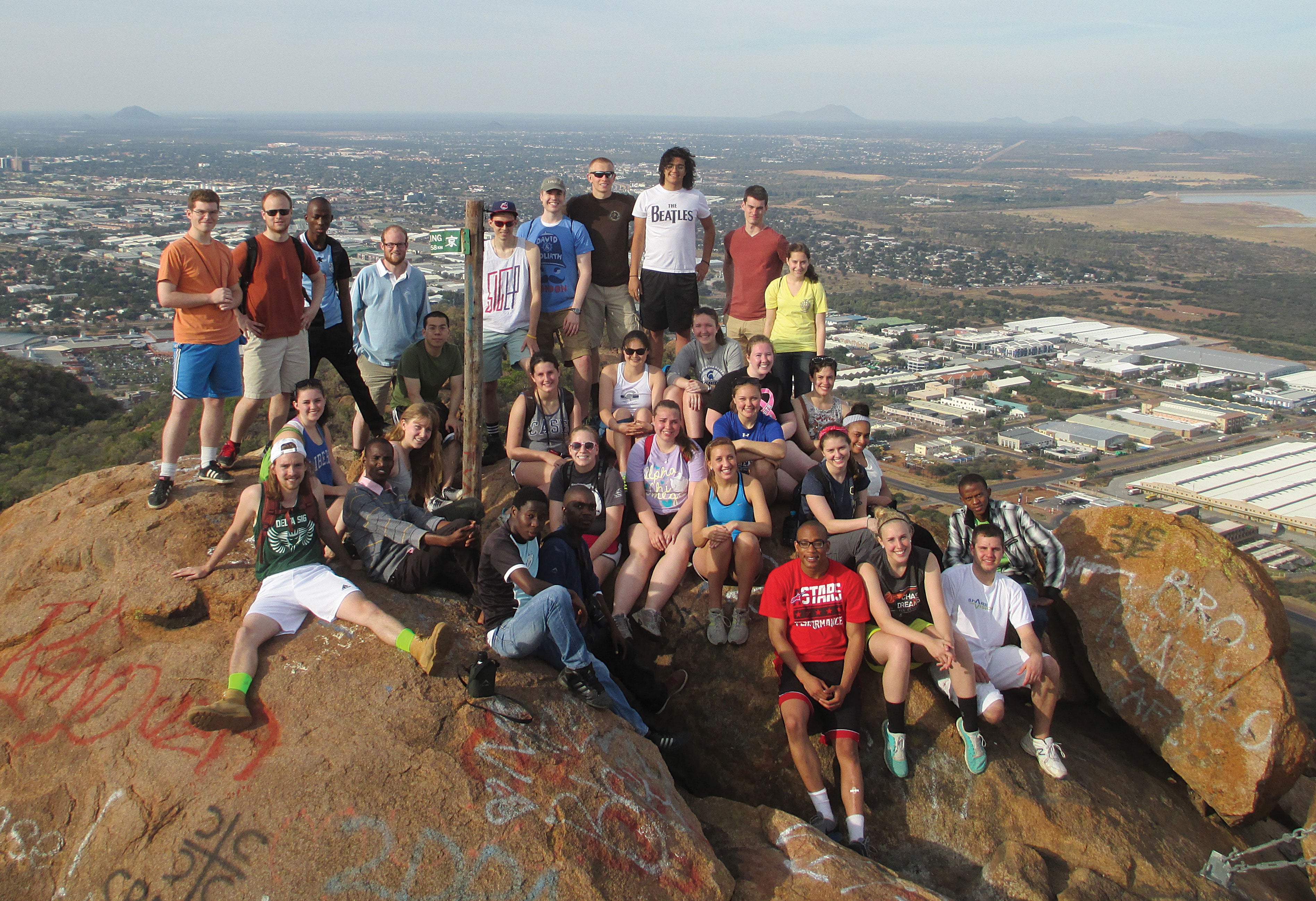features
FROM ACROSS THE WORLD TO CAMPUS
by Christine H. O'Toole
 Photo: Roadell Hickman
Yuan "Arthur" Jia
Photo: Roadell Hickman
Yuan "Arthur" Jia
If you're looking for a typical Case Western Reserve University student, consider Yuan "Arthur" Jia. He's an engineering major who plans to become an entrepreneur. He's an accomplished clarinetist who's already toured the U.S. with a youth orchestra, an intense online gamer and an avid pick-up basketball player.
A graduate of the Affiliated High School of Peking University—arguably China's most elite prep school—Jia was drawn to Case Western Reserve by its size and number of engineering options. Arriving on campus for the first time in August 2013 after a 7,000-mile flight from Beijing, the then 18-year-old liked what he saw.
"The gardenlike campus just exceeded my expectations, and getting around walking was just a treat to my eyes and my lungs," Jia said. "I went to all the orientation activities. It was a ton of fun, and I really got familiar with the dudes from my building."
Intensely focused and highly qualified, Jia could be a standout on any U.S. campus. But at Case Western Reserve, he is among a growing influx of undergraduates from other nations. The university's international undergraduates now represent nearly 10 percent of the student body, compared with 5 percent in the 2009-2010 academic year. Chinese citizens such as Jia compose 69 percent of the university's international undergraduate enrollment.
Over the past five years, Case Western Reserve appointed its first associate provost for international affairs and created the Center for International Affairs to lead the development and implementation of the university's internationalization strategy, coordinate research and exchange programs, emphasize international undergraduate recruitment and encourage more students to study abroad. Now the effort is expanding to meet the needs of diverse international students on campus, as they adapt to a cultural immersion that plays out in classrooms, residence halls, dining facilities and buses.
Like their American classmates, many of the international students still are slightly homesick, navigating campus culture while also tackling a demanding course load. But unlike their peers, they often face the added challenge of performing at the highest academic levels in a foreign language.
Molly Watkins, Case Western Reserve's executive director of international affairs, sees the issues first hand. Her staff coordinates year-round programs to welcome and integrate non-U.S. students within the campus. She also works with the university's First-Year Experience and Family Programs staff as they plan the international welcome days that precede each fall's new student orientation week. Two days are barely enough, she said, to guide internationals through the bureaucratic rituals their U.S. classmates already have navigated: driver's licenses, mobile phones, bank accounts, bus passes and more. "This is not [learning] how to go to a ballgame," she said. "It's how to get dinner."
To expand on the two days, the center recently rolled out a new weekly international student success program designed to help students better understand the social and academic culture on campus.
Fluency in English is, of course, a foundation for success and socialization. International applicants to Case Western Reserve currently must score a minimum of 90 (on a scale of 0 to 120) on the Test of English as a Foreign Language (TOEFL).
For Jia, who began serious English language study in third grade, the language is "a tool, not a subject. It's like learning a musical instrument." While he achieved a sophisticated command of English in Beijing, many other international students move to the United States for high school, with a goal of landing a place at a top U.S. university with their stronger English skills.
 Photo: Nicole Mammoser
Linh Tran
Photo: Nicole Mammoser
Linh Tran
In Vietnam, Linh Tran's (CWR '14) parents agreed to let her leave home at age 14 to attend a Virginia boarding school for what the family expected to be one year. But, said Tran, "I fell in love with the school and the various opportunities that the U.S. education provides, so I decided to stay." Active on the Case Western Reserve campus‚ she was the 2013 homecoming queen‚ she also served as a resident assistant, observing with empathy the challenges of her international floor mates.
"The most common concern among Case Western Reserve students is the academic load," she said. "For international students, it's extra hard processing, critically analyzing and applying information to real-world situations. It's not just memorizing facts. Homework might take three times as long."
Cami Thompson, the international student and scholar liaison at the university's Center for International Affairs, noted that family expectations often are different for international students.
"Mothers, fathers and grandparents are all counting on their student to excel‚ and get straight A's as a measure of their success," she said. "So they may be less involved on campus because academics are the primary job. The cultural construct of the university is different, especially in Asia. They don't have student activity departments‚ extracurriculars are not part of the university experience. So when they come here, they don't understand why we encourage involvement and value engagement on top of their rigorous academic expectations."
Now graduated, Tran said the intense effort and shyness may keep students from making American friends.
"Some people are self-conscious about their English, so they don't reach out to professors and peers enough to get support," said Tran, who is now pursuing a master's degree in student affairs at the University of Maryland in College Park. "I used to think, 'If I just study the class materials, I'll get it.' But studying with friends and communicating with professors really helps."
Often, those friends are fellow international students; just as U.S. expats often appreciate time with Americans when abroad, so do international students. Tran acknowledged that some of her peers "stay in their bubble‚ their comfort zone. Other students want to speak English, and they're outgoing."
Jia, the engineering major from China, enthusiastically embraced the latter approach from the fall of his first year, when he participated in fraternity recruitment and joined Phi Kappa Tau.
"I wouldn't be honest if I say I wasn't deliberate about that. For networking and making friends in general, it's a pretty good way to start," said Jia, who also plans to attend graduate school in the U.S. "It's like investing one day in your week in a group of close friends, doing service projects and having fun."
 Photo: Roadell Hickman
Yuan "Arthur" Jia and Will Breckwoldt were roommates as first-year students in 2013-2014 and remain friends.
Photo: Roadell Hickman
Yuan "Arthur" Jia and Will Breckwoldt were roommates as first-year students in 2013-2014 and remain friends.
Jia and his first-year roommate, Will Breckwoldt, noted that it's not possible to generalize about how different nationalities blend on campus. When it comes to one-on-one interactions, Breckwoldt and Jia agreed: It's no big deal.
Breckwoldt, from Houston, also is an engineering major and plans to earn his bachelor's and master's degrees in five years. "Everyone in my family except me speaks German, so I was the worst candidate for being paired with an international roommate," he joked. In a pre-college visit to campus, he chose a corner room for extra space and big windows. That it also came with a Chinese roommate was only a minor surprise.
"At the most basic level, it wasn't a huge deal," he stressed. "Arthur was very fluent in English. He was more in tune with U.S.-Chinese relations than I am, so I learned a bit. And of course I'd never had a roommate from the U.S. either."
As more international students arrive on campus, the multicultural climate may become the new normal. "I know lots of people from other nationalities," said Mike McKenna, a junior from the Chicago suburbs who is the director of print for the student weekly newspaper, The Observer, this year. "I have one U.S. friend who's from an Indian family and has lived in Germany and in England. It's not strange‚ it's normal. And that's awesome."
McKenna hopes the university will attract students from other parts of the world as well as Asia. "We have a lot of students from China. It's great to make inroads, but for diversity we need to expand to students from elsewhere," he said.
David Fleshler, JD, associate provost for international affairs, confirmed that an effort to diversify international enrollment already is underway. Undergraduate admissions staff is spending significant time recruiting in India, Singapore, various countries in Europe and elsewhere.
"These activities typically take several years to begin to see results, but we have an early indication that this strategy is likely to work," Fleshler said, noting that after actively recruiting in India for the past several years, the university has seen an increase in undergraduate Indian students this fall.
 Photo: Roadell Hickman
Neha Dwivedi
Photo: Roadell Hickman
Neha Dwivedi
The Indian community includes senior Neha Dwivedi, who chose Case Western Reserve to combine the study of medicine and engineering. But studying biomedical engineering in Cleveland has put her home in Goa out of reach.
"It had been two years since my last visit," said Dwivedi, who was able to go home for a month this past summer. "It's hard to live so far away, but too expensive to go back and forth."
But Dwivedi‚ who in 2012 was named best female vocalist at Gathe Raho, a national a cappella college competition that blends English and Hindi songs, and currently works in a stem-cell engineering lab on campus‚ admitted the separation had benefits: "I got a chance to be myself and make my own identity in a new way."







